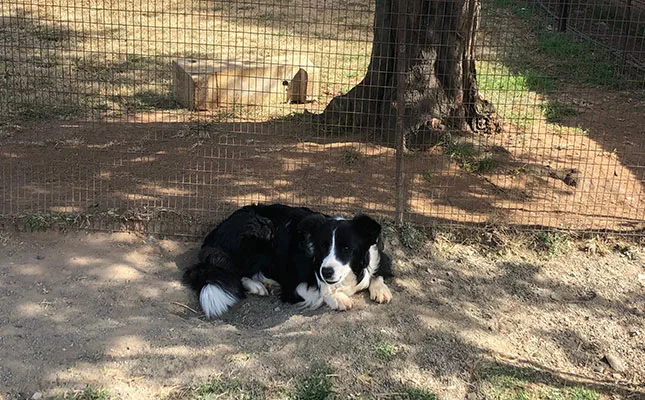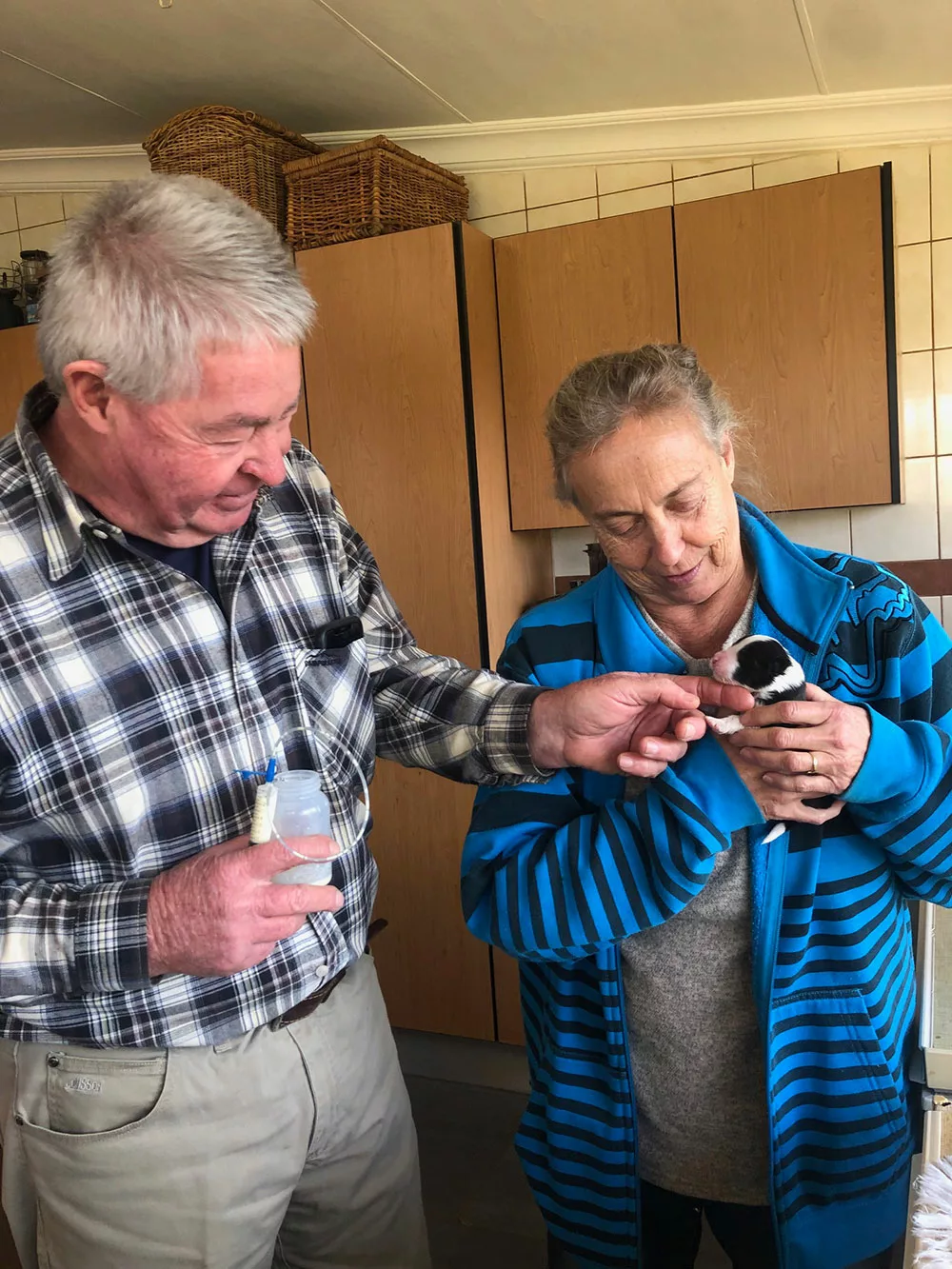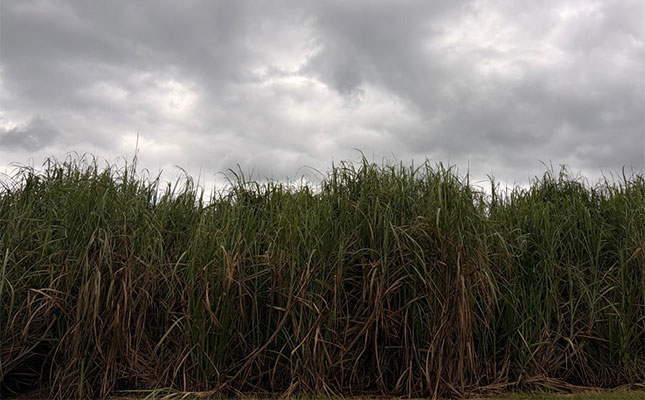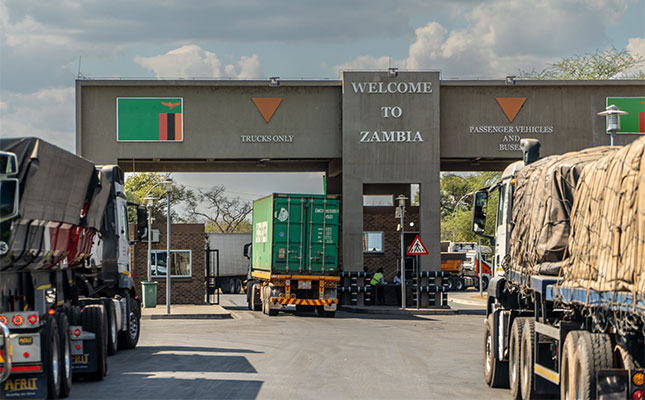
Mention Border Collie breeders in South Africa, and Venron Border Collies (Venron) is likely to come up. Ronald and Venessa Juckes have built a reputation for their outstanding dogs, including Kennel Union of Southern Africa (KUSA) breed champions and grand champions.
“There has only been one supreme champion, and that was our Glen, whom we bred, owned and showed,” says Venessa. The Venron puppies are bred from these award-winning lines, ensuring an exceptional lineage.

The couple have extensive handling, training, and breeding experience, and are predominantly involved in KUSA activities. Ronald’s industry credentials are also impressive.
“Ronald has handled Border Collies competitively in Europe. He is qualified to judge all herding breeds in South Africa and is recognised by various international bodies around the world,” says Venessa.
“He judged at the Australian Border Collie Nationals and has been invited to judge at the Border Collie Club of Great Britain’s 50th Anniversary Show next year.”
Additionally, Ronald has served on the federal council of KUSA for over five years, he is the chairperson of the Free State Kennel Club, and chairperson of the Sasolburg Kennel Club.
The early days
Ronald was once involved in judging sheep and collaborated with friends who were stud farming Ile de France sheep in KwaZulu-Natal. It was from this farm that they bought a seven-week- old Border Collie, Nandi, 37 years ago, taking her home to their 0,2ha property in Kempton Park, Gauteng.
The couple acquired Nandi’s brother, Biggles, soon afterwards. This was the beginning of a lifelong passion for the breed.
They worked at South African Airways at the time and used their international travel to “immerse themselves in the essence of the breed,” says Ronald. They saw global standards first hand, met with breeders and handlers, viewed and handled many Border Collies, and attended numerous competitions, such as the renowned Crufts event in Birmingham in 1990.
“Not long after Crufts, we imported our first Border Collie, Charles, from the UK. He came from a New Zealand bloodline,” says Ronald.
The couple would go on to import more dogs from the UK, and also from Australia and the US.
In the early days, they competed in various disciplines (obedience, carting, and jumping) and trained with various sheepdog instructors. In 1992, Nandi earned the South African Sheepdog Association’s Certificate of Working Ability (CWA 559). But it was when the couple was introduced to breed shows that they realised they had found their niche, and this is where they still compete today.
Ronald and Venessa relocated to Lions Rest Farm near Heidelberg in the early 1990s to give their dogs more space and freedom, initially using them to move stock. Venessa left South African Airways to train and look after the dogs.
Ronald is now retired and says they are “hobby farmers” involved with Bonsmara cattle and sheep production, and share 100ha of maize with a neighbour. The couple continue to travel abroad to connect with fellow dog breeders, view bloodlines, and stay up to date with developments in the international Border Collie community.
Breed characteristics
Border Collies have their origins in Great Britain. Their intelligence, hard-working, tenacious nature, and high energy, coupled with a natural herding instinct, led to their historic utilisation as sheepdogs. This natural drive must be carefully guided, however. A Border
Collie requires training to channel its energy and enable it to work calmly with sheep and co-operatively with its handler, Ronald and Venessa explain.
They recommend that puppies start sheep work around the age of five to six months when they are fast enough to outrun a sheep, but they should only be worked for a few minutes a day.
Puppies should not be exposed too early to challenging sheep like ewes with lambs, or rams, as this can knock their confidence. It’s best to start training with ‘dogged’ sheep – those that are calm and familiar with working dogs.
In terms of temperament, the Kennel Union of London describes the ideal Border Collie as balanced – neither nervous nor aggressive – while also being keen, alert and responsive. Ronald highlights their superior intelligence: “They have a ‘reasoning intelligence’ while other dogs have a ‘learning intelligence’. In fact, their reasoning ability is that of a five-year-old child.”
He gives an example of a sheepdog arriving at a closed paddock with a flock. This dog may initially wait patiently but then give up and wander off, as would the sheep. “A Border Collie would regard this as a puzzle, investigating the paddock and looking for openings or some other way to get in,” says Ronald.
This is why at Lions Rest Farm, bitches in season are kennelled in enclosures with secure gates, high walls and overhead roofing, without which they would scale the walls or find another way to escape in search of a mate.
Border Collies are known for bonding with one human (Ronald and Venessa are each favoured by certain dogs), and some individuals can be highly independent. However, the Venron dogs love to meet and greet strangers and enjoy attention, making them good family dogs.
Breeding practices
The couple’s operation focuses on breeding for the improvement of Border Collies, producing puppies capable physically and mentally of meeting their future owners’ needs, whether as working partners or companions. Ronald emphasises that “if dogs are not fit for function and well constructed, they should not be bred”.
All Venron dogs and puppies are registered with KUSA and the South African Sheepdog Association.
Venessa explains that their breeding process is long, with many factors to be considered. “Our mantra is temperament, which includes working ability and activity levels, health, and physical/mental soundness,” she says.
The couple begin by identifying their breeding stock, and a slew of tests are then performed. Bitches are DNA-tested for genetic diseases with the use of internationally sourced DNA kits. The mouth swabs are sent to a laboratory in Scotland for analysis.
“The results give us every bit of knowledge to plan our breeding process down to coat colour,” says Ronald. The breeding stock is also health-checked by vets who ensure all inoculations are up to date.
“Weeks are spent studying pedigrees, phenotypes [physical characteristics] and genetic results to identify the most suitable mate for each girl,” says Venessa.
They draw on their database of thousands of Border Collie pedigrees in South Africa and abroad, allowing them to calculate relationship and inbreeding coefficients going back as far as 10 to 15 generations.
The coefficients are a measure of how likely a puppy is to inherit the same gene variant from both its parents, due to the parents sharing a common ancestor. A higher percentage can increase the risk of genetic health problems.
The couple have imported many dogs over the years, but have recently been importing semen to ensure genetic diversity in their bloodlines.
“Once we’ve identified the most suitable pairing, we determine the timing – we have a database listing each girl’s seasons,” says Venessa.
“Then we factor in two months’ gestation and two months of puppy rearing, and ensure that during this time we are home to facilitate the breeding, birthing and rearing.”
Customised birthing crates are used to ensure the dam does not accidentally lie on the puppies.
Venron breeding stock is not bred under two years of age, nor over the age of seven.
“During a lifetime, most of our girls will have a maximum of three litters, spaced roughly every 18 months to two years apart. This is done to ensure a girl’s long-term health, and it also gives us the opportunity to evaluate her pups from previous litters and make notes of the positives and negatives,” says Venessa.
Dogs that are no longer being bred remain with the family for the rest of their lives.
Puppy raising
Puppies are closely monitored and exposed to gentle handling. In cases where the litter is large or when the dam struggles to produce enough milk shortly after giving birth, puppies are supplemented through tube-feeding until they can be progressed to bottle-feeding.
“We start to introduce solids from about three weeks, which is when the real work starts with three to four meals a day, vet visits for first inoculations, deworming and microchipping,” says Venessa.
Venron also uses an early neurological stimulation programme during puppy raising, which involves tactile stimulation, thermal stimulation and exposure to mild stressors. This improves puppies’ stress responses and improves their cognitive function.
“In the puppy area, puppies emerge from their kennels by themselves and become house-trained naturally,” explains Ronald. This is also where socialisation takes place by exposing the litter to sheep, other dogs, and humans of different ages and sizes.
At seven weeks, Venron puppies are evaluated for health and conformation, and temperament-tested to determine factors such as activity level, independence, and affinity for working with humans.
Compatibility and successful homing
Ronald and Venessa work closely with prospective owners, visiting their farms to assess compatibility based on factors such as lifestyle, property type, and the age of their children (very young children and Border Collies can be a challenging combination due to the dogs’ herding instinct and high energy level).
Prospective owners are also made aware of Border Collies’ requirement for physical activity and mental stimulation, without which they can become restless and develop unwanted habits. People seeking pets rather than working dogs have to be prepared to invest significant time and effort in their Border Collies.
Venron puppies are only made available to approved homes, and remain in the couple’s care until they are eight weeks old. After purchase, owners are supported, with Venessa and Ronald making themselves available for questions and feedback.
While the couple ensure basic puppy training, they stress that the onus is on the owner to continue with training. They also insist that puppies attend socialisation classes and an obedience course to forge a bond and lay the foundation for a well-behaved companion.
Challenges for breeders
Venron’s success has been built on the individual strengths of the couple, both of whom are actively involved in every facet of the enterprise. However, the industry is not without its challenges.
“There’s no cutting corners with professional dog breeding, and it’s an expensive business. The hard work that goes into it is also not always apparent,” says Ronald. As a result, a registered, inoculated puppy from fully health-tested parents, bred by an ethical breeder, could cost upwards of R20 000.
Venessa adds that increasingly complex regulatory requirements are a significant challenge for breeders of pedigree dogs.
“New regulations imposed by the Department of Agriculture have effectively doubled the price of imported bloodlines, which are required by ethical breeders to maintain genetic diversity in the breed. We are now required to use ‘agents’ and pet travel companies to do what we have always done.
“There is also additional, time-consuming paperwork that has to be completed by the agent.
The longer this takes, the older and bigger the pup gets, requiring a bigger crate and additional inoculations and blood tests. This means that the average breeder, no matter how passionate about their breed, cannot afford to bring in the required lines.
“Many ethical breeders will simply stop breeding, which will leave a large gap in the market for unscrupulous backyard breeders who do not care about the health and temperament of the pups they produce,” says Venessa.
Venron has made a significant contribution to elevating breed standards in South Africa, but it faces an uncertain future. For now, clients choosing a puppy from Venron are not only investing in quality, sound temperament, and reliable working ability – they are supporting ethical breeding practices.
Email Venron Border Collies at [email protected].
Get trusted farming news from Farmers Weekly in Google Top Stories.
➕ Add Farmers Weekly to Google ✔ Takes 10 seconds · ✔ Remove anytime






